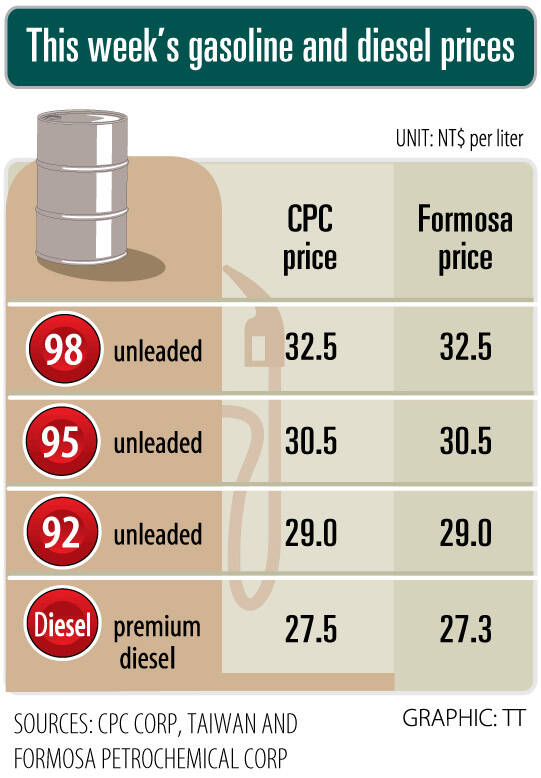Domestic gasoline and diesel prices are to drop NT$0.1 and NT$0.2 per liter respectively this week, despite international crude oil prices rising last week as the situation in the Middle East remained tense, CPC Corp, Taiwan (CPC, 台灣中油) and Formosa Petrochemical Corp (台塑石化) said in separate statements yesterday.
After Iran launched a large barrage of missiles against Israel on Tuesday night and Israel vowed to retaliate, fears that escalating tensions between the two nations could spark a wider Middle East conflict sent global oil prices higher last week, the companies said.
US West Texas Intermediate crude oil rose 0.9 percent to settle above US$74 a barrel on Friday, soaring 9.1 percent in the week — the biggest weekly advance since March last year — while Brent crude increased 0.6 percent to US$78.05 per barrel, Bloomberg News reported on Saturday.

CPC said that based on its floating oil price formula, the cost of crude oil grew 0.86 percent last week from a week earlier.
The company said its gasoline and diesel prices should have increased by NT$0.6 and NT$0.7 per liter respectively, but that it would absorb part of the cost increases and use a price stabilization mechanism to comply with a government policy of keeping domestic fuel prices lower than in major neighboring markets.
Formosa matched CPC’s price adjustments after accounting for factors such as global oil market trends, the exchange rate for the New Taiwan dollar and fierce domestic market competition, it said.
Effective today, gasoline prices at CPC and Formosa stations are to decease to NT$29, NT$30.5 and NT$32.5 per liter for 92, 95 and 98-octane unleaded gasoline respectively, the companies said.
Premium diesel would cost NT$27.5 per liter at CPC stations and NT$27.3 at Formosa pumps, they said.

SEEKING CLARITY: Washington should not adopt measures that create uncertainties for ‘existing semiconductor investments,’ TSMC said referring to its US$165 billion in the US Taiwan Semiconductor Manufacturing Co (TSMC, 台積電) told the US that any future tariffs on Taiwanese semiconductors could reduce demand for chips and derail its pledge to increase its investment in Arizona. “New import restrictions could jeopardize current US leadership in the competitive technology industry and create uncertainties for many committed semiconductor capital projects in the US, including TSMC Arizona’s significant investment plan in Phoenix,” the chipmaker wrote in a letter to the US Department of Commerce. TSMC issued the warning in response to a solicitation for comments by the department on a possible tariff on semiconductor imports by US President Donald Trump’s

The government has launched a three-pronged strategy to attract local and international talent, aiming to position Taiwan as a new global hub following Nvidia Corp’s announcement that it has chosen Taipei as the site of its Taiwan headquarters. Nvidia cofounder and CEO Jensen Huang (黃仁勳) on Monday last week announced during his keynote speech at the Computex trade show in Taipei that the Nvidia Constellation, the company’s planned Taiwan headquarters, would be located in the Beitou-Shilin Technology Park (北投士林科技園區) in Taipei. Huang’s decision to establish a base in Taiwan is “primarily due to Taiwan’s talent pool and its strength in the semiconductor

Industrial production expanded 22.31 percent annually last month to 107.51, as increases in demand for high-performance computing (HPC) and artificial intelligence (AI) applications drove demand for locally-made chips and components. The manufacturing production index climbed 23.68 percent year-on-year to 108.37, marking the 14th consecutive month of increase, the Ministry of Economic Affairs said. In the first four months of this year, industrial and manufacturing production indices expanded 14.31 percent and 15.22 percent year-on-year, ministry data showed. The growth momentum is to extend into this month, with the manufacturing production index expected to rise between 11 percent and 15.1 percent annually, Department of Statistics

An earnings report from semiconductor giant and artificial intelligence (AI) bellwether Nvidia Corp takes center stage for Wall Street this week, as stocks hit a speed bump of worries over US federal deficits driving up Treasury yields. US equities pulled back last week after a torrid rally, as investors turned their attention to tax and spending legislation poised to swell the US government’s US$36 trillion in debt. Long-dated US Treasury yields rose amid the fiscal worries, with the 30-year yield topping 5 percent and hitting its highest level since late 2023. Stocks were dealt another blow on Friday when US President Donald